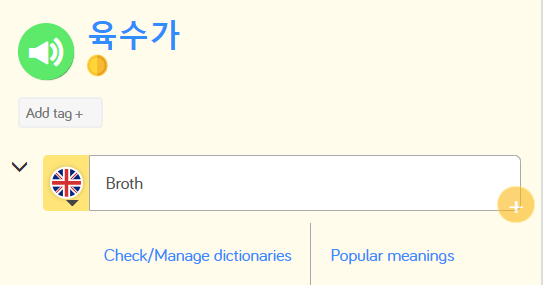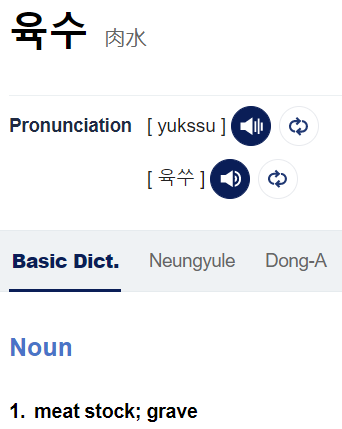In the following screenshot, 육수가 is recognized as “broth”, but actually 가 is particle and it should not be seen as part of a word.
Following is what I found on naver dictionary:


In the following screenshot, 육수가 is recognized as “broth”, but actually 가 is particle and it should not be seen as part of a word.
Following is what I found on naver dictionary:


I am not sure if there’s anything we can do about it, since I don’t think at the moment our reader can recognize particles and not include them in a word. I’ll check with our dev team.
Since Korean has spaces between words so to speak, LingQ just considers anything up to the space to be a single word. Some people argue this is a benefit but I disagree. You’ll see most definitions ignore the particles and conjugating etc.
I am a Korean learner too and I have to agree with OP that particles should be considered as separate entities. If in the future we could have a reader able to identify particles, that would be fab. I am sure Japanese learners would appreciate it too since they will face the same problem.
The word “걸기” means “a sturdy spirit”. But “걸기” can also be formed by adding the “기” particle to the verb “걸다”. The word “양동이” means “bucket” but the word “양동” means “diversion” or “demonstration”. How would LingQ know when to treat “기” or “이” (and so on) as a particle versus as part of the base word? Asking this of LingQ is almost like asking it to determine the meaning of every word from its context. I don’t know if that would be possible.
If this were even possible, there is also the question of what would be lost by switching to this behavior. (A lot, I think.)
Yeah eastern asain languages have spacing issues chinese/japanese write without spaces because of 한자
korean only recently got rid of hanja (past 100 years) but still used spaces then but it seems native koreans dont even know standard spacing rules one will often see structures like this
요리하고싶습니 or 거지있는공원 or
식당하고집 these are multiple words written together but as alot of native english speakers dont know the difference between they’re, their, there or whether they just dont care is just a fun part of korean lol. It would be nice if particles were seen as seperate but since they attach to words like dgbeecher said impossible for lingq or any program to parse language like that. Good luck with korean!
I know that asking LingQ to determine the meaning of words from the context is just impossible. And I think LingQ don’t have to “switch” to this behavior. For the word “걸기”, it should just provide all kinds of options like “걸기” itself and “걸다”, so learners can determine which word to add to their notebook by themselves.
What do you mean by “reader”? Are they LingQ’s employees or learners on LingQ? I think learners should have learn grammars elsewhere, and recognizing particles should be easy for them.
I agree your opinion. When adding a word to notebook, the word itself is conjugated, but the explanation is unconjugated, that’s not reasonable. They should either make the word unconjugated or make the explanation conjugated.
Same sentiment here. I bought the lifetime korean thinking that it would be a breeze. but nope. ![]()
like the functionality of korean on lingq or the general difficulty of the korean language?
The particles in Korean are limited, so I guess it should not be difficult to write a rule to drop 이/가/은/는/… and then validate if the processed words appear in dictionary.
All “Popular Meanings” are user-generated. You will find some that address both the base word and the attached particle(s). You are welcome to use these, or create your own, if you feel it would support your learning.
Identifying and understanding particles is a primary difficulty of learning Korean. There are many particles; they serve multiple functions; and they are combined in multiple ways. And the syllables that serve as particles are frequently used as part of base words.
I can’t imagine how LingQ would possibly decipher all this for me. And I feel that the work I put into understanding particles is essential to the process of learning Korean.
I think that the issue addressed in this thread represents not a difficulty of using LingQ, but rather a (very real) difficulty of learning Korean.
For help understanding particles, I recommend Routledge’s “Korean: A Comprehensive Grammar”, particularly the “Index of grammatical constructions”. But continued reading/listening is probably the best approach. Have fun!
Japanese doesn’t have spaces between the words so LingQ actually tries to parse it. With mixed success.
Both actually. haha